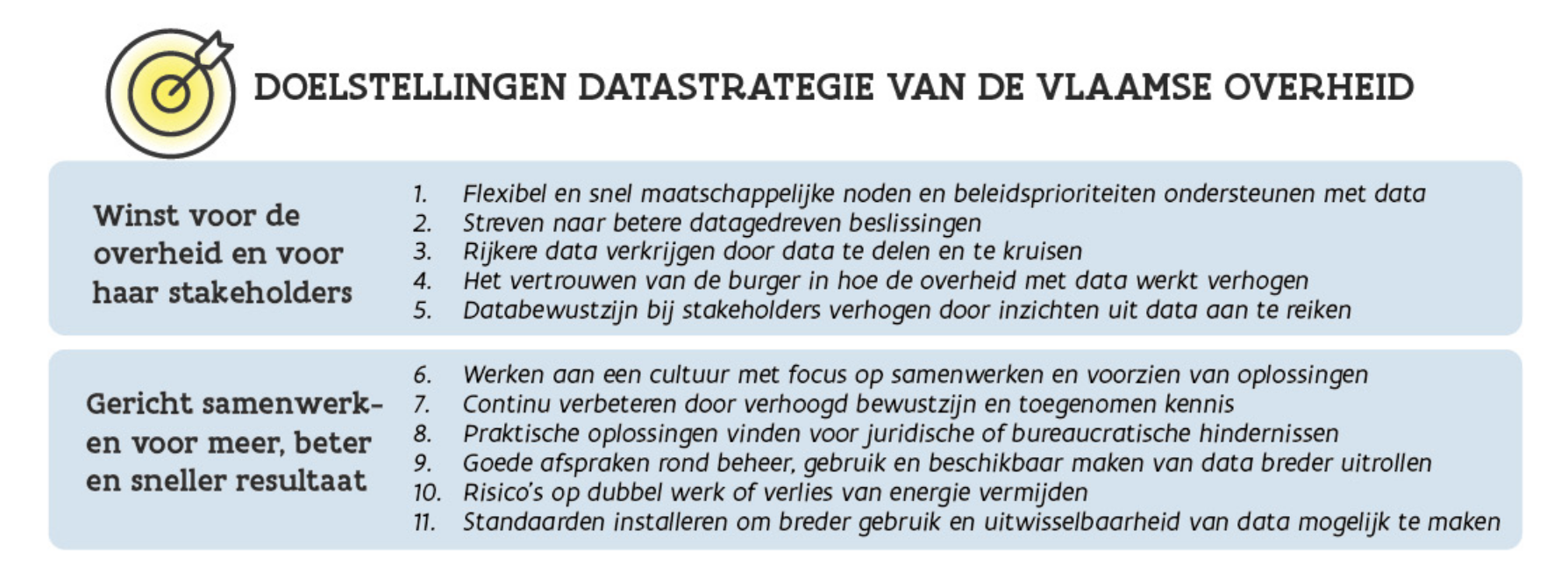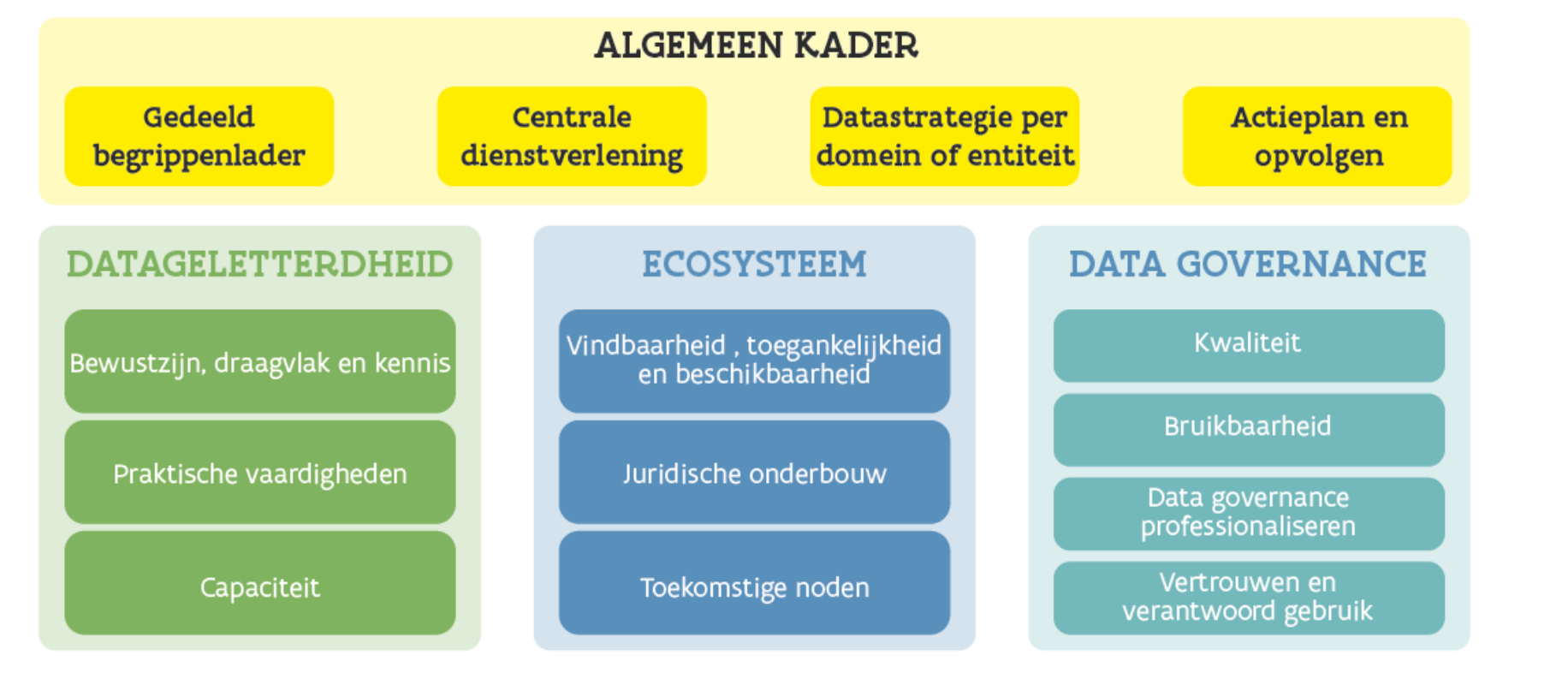Flanders – Flemish Data strategy
The data strategy aims to strengthen a data-driven culture within the Flemish Government. The accompanying action plan contains a total of 202 actions, spread over four action domains: offering a general framework, focusing on data literacy, working within an ecosystem and good and responsible management and use of data.
What: Administrative decision
Impact score: 3
For who: policy makers
URL: Vlaamse Datastrategie - Actieplan
Summary
The Flemish government, together with a number of partners, has developed a vision on how it wants to make concrete use of the quantity of data at its disposal in the coming years. The strategy offers a guide to the smart and responsible use of data, aims to create benefits for the government and its stakeholders, and focuses on targeted cooperation for more, better and faster results.
The strategy follows on an advice from the Social and Economic Council of Flanders (SERV) in 2020, recommendations from the social and economic relaunch committees set up as a result of the COVID-19 crisis, and the launch of the European Data Strategy.

The strategy is built around four foundations:
- The action domain General Framework
- The action domain Data Literacy
- The action domain Ecosystem
- The action domain Data Governance

To make the strategy immediately tangible, a joint action plan was attached to it, with 202 actions. The actions are developed around four objectives:
- Increasing data quality and availability
- Improving data retrieval and accessibility
- Improve user-friendliness and ethical handling of data
- Stimulating a culture of data exchange within the governments
The four action areas of the data strategy are outlined below:
General Framework
The first action domain of the data strategy consists of the creation of a common basis that should provide more uniformity in data-driven work in government. The General Framework contains a common conceptual framework and indicates which services are provided. The framework also provides for a joint action plan to ensure that the data strategy can be followed up comprehensively.
Data Literacy
This part of the strategy is aimed at increasing data expertise within the government and raising the data literacy of staff. The approach is built around three steps:
- Increase awareness and support for data-driven work
The Flemish government wants all employees to be aware of how they can contribute to data-driven work. Middle management is also committed to increasing data literacy.
Examples of concrete actions:
- The Department of Work & Social Economy is starting a data literacy programme (information sessions, awareness-raising, coaching)
- The VDAB will carry out a baseline measurement concerning data literacy within the VDAB
- Collaborations will be set up with academic institutions for the analysis of data
- Digital Flanders will provide a training offer for middle management - Broaden the data skills of employees and deepen those of experts
A basic training course on data will be developed for staff without technical skills. The training offer for data experts will be centralised and expanded.
Examples of concrete actions:
- The Agency for Innovation and Enterprise will roll out a broad training plan for staff, in domains such as AI, PowerBi and Azure - Increase additional measures for working with data, such as strengthening a central network of experts
In addition to measures to increase support and sharpen skills, the Flemish government also wants to take action to increase the capacity of data experts. Therefore, the government wants to adopt an attractive image. It wants to improve its online communication, offer internships and organise events such as hackathons.
In addition, Flanders Connect, a broad pool of experts, must be integrated into the data strategy. Furthermore, events aimed at external experts will also be organised.
Ecosystem
Improving the exchange and sharing of data is the basis of the third action area. Here a four-step approach is used:
- Findability & accessibility: Increasing the findability and accessibility of own data and solving the problem of the lack of accessibility of own data.
The Flemish government has already undertaken many actions to make data accessible, e.g. with the MAGDA platform and the Flemish open data portal. These initiatives will be extended and the range of other initiatives will be expanded.
Examples of concrete actions:
- Making educational data available through a new API portal
- The development of a VDAB data platform
- The development of the SOLID ecosystem by Digital Flanders - Availability: detecting a lack of good data and formulating solutions
This action point stems from the advice of the relaunch committees. That advice pointed out a number of blind spots where policy cannot yet be supported by data. The government is going to organise various initiatives in which it will upgrade existing databases and create new data in a targeted manner.
Examples of concrete actions:
- Development of a data warehouse for the Departement Omgeving - Legal foundation: Developing explanatory notes and making practical arrangements to make the handling of the policy framework more data-friendly
The Flemish government will pay more attention to the challenges and future needs of a data-driven government in new regulations and legislative initiatives.
Examples of concrete actions:
- The Flemish Environment Agency (VMM) is examining whether it can include open data provisions in new specifications for research contracts - Future needs: Creating networks to detect common challenges faster and reach solutions through cooperation
Examples of concrete actions:
- The agency Opgroeien Regie tries to set up collaborations for better data sharing (e.g. between hospitals, midwives and Kind & Gezin or with local authorities).
Data governance
The last action domain is Data governance. Here, the Flemish Government wants to roll out an overarching and standardised management of data to achieve better data quality and improve (re)use. The strategy foresees four different pillars:
- Quality
The Flemish Government is going to work on a central overview and agreements on data standards, use of authentic data sources, standards, expectations and targets for quality. It is also going to improve data quality at the source.
Examples of concrete actions:
- The Department of Work & Social Economy will monitor data quality through specific dashboards. - Usability
The government is going to introduce procedures to verify whether data is good enough for a certain purpose and can be opened up.
Examples of concrete actions:
- OVAM's MATIS data monitoring system is being expanded so that the data can be used for a larger number of processes - Professionalise data governance processes
The Flemish government is working on a clear division of tasks and qualitative processes supported by central standards and building blocks. - Increase confidence in responsible use of data
The Flemish government will communicate more to all its stakeholders about efforts in data governance and in the ethical use of data.